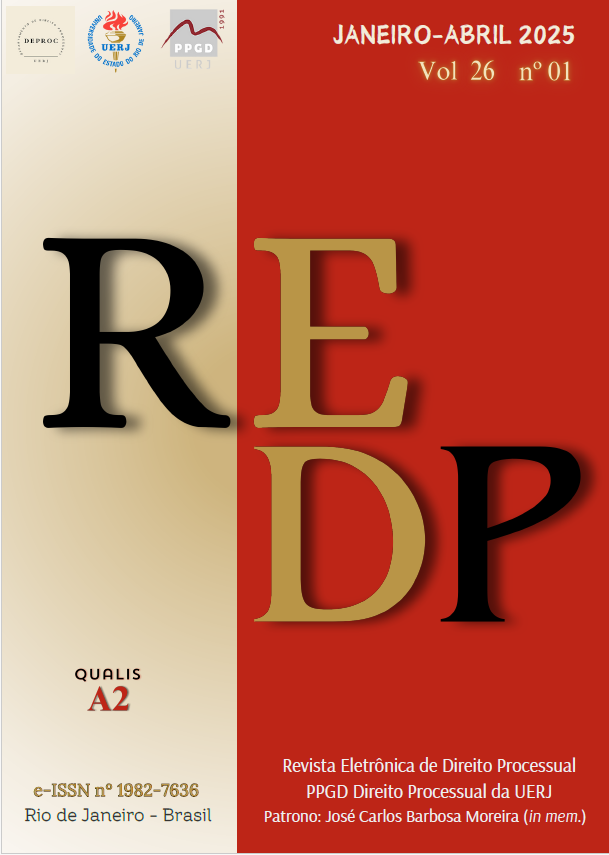A “TRAGÉDIA DA JUSTIÇA” E O PRIVATE ENFORCEMENT: BREVES APORTES
BREVES APORTES
DOI:
https://doi.org/10.12957/redp.2025.79635Abstract
: The Brazilian civil process is experiencing a “tragedy of justice” scenario: it is slow (a process takes, on average, more than 5 years to complete its life cycle), inefficient (Brazil is the worst country among its neighbors in terms of efficiency of civil justice) and expensive (more than 100 billion reais are spent on the judicial structure, 1.3% of GDP, which is practically double what the European Union countries spend on their respective structures, obtaining results much more satisfactory in terms of efficiency of justice), which creates structural incentives for demandism and widespread non-compliance with contracts and Court orders. As a possible solution to this scenario, the use private enforcement as a fundamental factor in the effectiveness of the fundamental right of access to justice arises from technological advances and changes in social reality. Counterintuitively, the use of the private route can maximize the capacity to deliver effective judicial protection, since it implies gains in efficiency by changing the classic order of due legal process and delegating to the state jurisdiction (of knowledge and execution) only the cases whose self-enforcement is not possible. However, to fit this piece into the current puzzle of the Brazilian civil process in a dogmatically adequate way, especially with the reinterpretation of classic procedural institutes such as the state's exclusivity in the use of force and the indefeasibility of jurisdiction, it is necessary to understand that the guarantees procedural processes are ductible and the process itself constitutes an essentially cultural element, so that the contextual changes of society are not contained by the process, but rather absorbed by it. Therefore. The review of some of the old procedural dogmas in the face of the new paths opened by technological advances and social changes is an unavoidable path towards a procedural dogma that presents effective responses to modern problems, as is the case of the demandism that suffocates Brazilian courts.
Downloads
Published
How to Cite
Issue
Section
License
Copyright (c) 2024 Gustavo Osna, Leonardo Maciel Benedete

This work is licensed under a Creative Commons Attribution 4.0 International License.
Todos os artigos publicados na Revista Eletrônica de Direito Processual (REDP) (Departamento de Direito Processual, Universidade do Estado do Rio de Janeiro, Brasil) são licenciados por meio de uma Licença Creative Commons - Atribuição 4.0 Internacional (CC BY 4.0).
Os autores retêm os direitos autorais de seu artigo e concordam em licenciar seu trabalho com a licença CC BY 4.0, aceitando assim os termos e condições específicos desta licença disponíveis no seguinte website: https://creativecommons.org/licenses/by/4.0/legalcode.
- Os autores concedem à REDP o direito de primeira publicação, de se identificar como publicadora original do trabalho e concedem à revista uma licença de direitos não exclusivos para utilizar o trabalho das seguintes formas: Reproduzir, vender e distribuir cópias eletrônicas ou impressas do manuscrito como um todo, de partes específicas do manuscrito e de suas traduções para qualquer idioma;
- O uso do artigo por terceiros é livre, contanto que a integridade da publicação seja mantida e seus autores originais, periódico de primeira publicação e detalhes de citação sejam identificados.
Dentro dos termos da licença, os autores podem entrar em acordos contratuais adicionais separados para a distribuição não exclusiva da versão publicada do trabalho na revista.
Copyright and Licensing
All articles published in the Procedural Law Electronic Review (REDP) (Department of Procedural Law, State University of Rio de Janeiro, Brazil) are licensed under a Creative Commons License - Attribution 4.0 International (CC BY 4.0).
- Authors retain copyright to their article and agree to license their work under the CC BY 4.0 license, thereby accepting the specific terms and conditions of this license available at the following website: https://creativecommons.org/licenses/by/4.0/ legal code.
- Authors grant REDP the right of first publication, to identify itself as the original publisher of the work, and grant the journal a non-exclusive license to use the work in the following ways: Reproduce, sell and distribute electronic or printed copies of the manuscript as a whole, of specific parts of the manuscript and its translations into any language;
- Use of the article by third parties is free, as long as the integrity of the publication is maintained and its original authors, first publication journal, and citation details are identified.
Within the terms of the license, authors may enter into separate additional contractual agreements for the non-exclusive distribution of the published version of the work in the journal.




